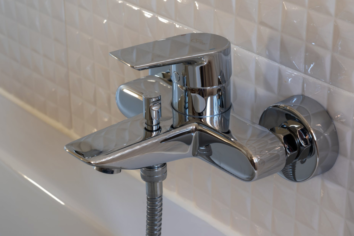A bathtub can teach us a lot about good operations

3 min read
A bit back I noticed that a small bit of paint next to a shower in our home was peeling. Closer inspection revealed that there was a tiny bit of water on the surface causing some minor water damage to the wall.
At first I thought some water just splashed out of the shower, but after keeping an eye on it for a few days it became clear that there was a small leak somewhere along the tile or glass wall that surrounds the shower.
I dug out some supplies from my basement workshop and started poking around a bit. I applied some silicone caulking to a gap I found, but the next day after morning showers the same spot on the wall was wet again.
That evening I again took my supplies upstairs and found another small spot where there was a gap between a glass wall, the shower base and adjacent tile wall. Some experimenting with drops of water revealed that if water splashed into that corner it could run into a gap right next to where the wall was being damaged. I applied some more silicone.
Finally, after the next day’s showers I checked and this time the spot on the wall was nice and dry. It appears I’ve finally found the root cause and stopped the problem at the source—of course in writing this the house maintenance gods will probably make me find a wet wall again tomorrow! With the root cause addressed I can go back and patch up the spot of damaged wall and touch up the paint.
Of course, I could have just ignored why the paint was peeling and wall being damaged, and instead each evening put a bit of drywall repair and paint on there and made it look like new. Every few days when the water damage re-appeared, I could just get out my supplies and fix the wall again. To impress the family with all the work I’m doing on the house, I could start publishing glowing reports talking about all the repair work I completed this week—I did 7 wall repairs just this week, we’re really on top of this house maintenance thing!
Of course that would be silly, but data often shows that complex service operations act just like this! For many reasons organizations often quickly loose sign of, or discipline over, the need to constantly focus on root cause. Fixing something over and over but ignoring the underlying driving root cause is not productive behavior.
Adding to the challenge, the metrics and other summary statistics that are a favorite of management reporting dashboards and PowerPoint decks not only miss the ‘root cause’ issue, but often given the impression that things are going great when in fact the opposite may be true. I’ve seen many cases where such reporting boasts about all the IT service incidents being resolved within agreed service-levels but completely misses the point (later revealed by process analytics) that 60+% of these incidents were wasteful efforts fixing the same errors while ignoring the root cause—these glowing management reports were boasting about fixing the wall in my bathroom over and over every night! Talk of extensive automation in such reporting often just masks the issue even further—”Hey check this out, we’ll have a robot come over to your house each night and patch up that wall. Look at all the automation we’ve got!”
Such a focus on quality (doing a great job patching up the wall) or automation for automation’s sake is misguided if the underlying work is not necessary. This is the general idea behind the mantra of:
Eliminate → Optimize → Automate
Doing a lot of great (optimized) work is misguided if such work should have been eliminated. Addressing root cause is often the primary means of eliminating problems before they happen again.
See a management report boasting about glowing performance? Sense check if all the work being discussed really needed to happen and if the leadership in that operation focuses on ‘elimination’ over the ‘optimization’ they’re reporting on.
If you’re managing said operation, ask yourself if what your team is working on is truly necessary and couldn’t otherwise be eliminated. As much as I’d like to have you come over and fix my wall this evening, I’d much rather we fix the actual problem and all move on to more productive work.

